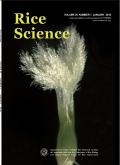基于多组学的水稻空间诱变世代遗传机制研究
IF 6.1
2区 农林科学
Q1 AGRONOMY
引用次数: 0
摘要
压力记忆的代际遗传在植物适应环境变化中起着至关重要的作用,特别是在太空飞行的背景下,植物可能作为长期任务中人类的食物来源。然而,太空飞行诱导的植物应激记忆的代际遗传效应仍不清楚。在这项研究中,我们利用SJ-10返回卫星任务中鉴定的水稻突变体B10评估了航天胁迫记忆的跨代遗传效应。结果表明,航天诱导的氧化应激效应一直持续到水稻的M5代。我们发现,水稻基因组在太空飞行后仍然不稳定,导致基因组甲基化水平的改变。此外,我们观察到转座子甲基化水平的显著变化,表明它们参与了太空飞行诱导的应激记忆的代际遗传。此外,我们在多个水稻世代中鉴定了数千个由航天胁迫记忆诱导的差异表达基因(DEGs)和差异选择性剪接(DAS)基因。值得注意的是,差异甲基化的胞嘧啶在非表达基因中比在DEGs或DAS基因中更丰富。大量与氧化应激相关的DEGs和DASs被鉴定出来,主要参与活性氧的产生和清除。本研究还报道了水稻选择性剪接事件对航天胁迫的响应。此外,我们的研究结果表明,基因组甲基化与基因表达相关,而与DAS无关。综上所述,本研究为水稻航天胁迫的代际遗传提供了全面的见解,并可能有助于揭示氧化应激诱导的基因组不稳定性和植物胁迫遗传中的表观遗传调控的新机制。本文章由计算机程序翻译,如有差异,请以英文原文为准。
Generational Genetic Mechanism of Space Mutagenesis in Rice Based on Multi-Omics
Intergenerational inheritance of stress memory plays a crucial role in plant adaptation to environmental changes, particularly in the context of spaceflight, where plants may serve as a food source for humans on long-duration missions. However, the intergenerational genetic effects of spaceflight-induced stress memory in plants remain unclear. In this study, we assessed the cross-generational genetic effects of spaceflight stress memory using the rice mutant B10, identified during the SJ-10 return satellite mission. Our results showed that the oxidative stress effects induced by spaceflight persisted until the M5 generation in rice. We found that the rice genome remained unstable post-spaceflight, leading to alterations in genome methylation levels. Additionally, we observed significant changes in the methylation levels of transposons, suggesting their involvement in the intergenerational inheritance of spaceflight-induced stress memory. Furthermore, we identified thousands of differentially expressed genes (DEGs) and differentially alternatively spliced (DAS) genes induced by spaceflight stress memory across multiple rice generations. Notably, differentially methylated cytosines were more abundant in non-expressed genes than in DEGs or DAS genes. A substantial number of DEGs and DASs related to oxidative stress were identified, primarily involved in the generation and scavenging of reactive oxygen species. This study also presented report on the response of alternative splicing events in rice to spaceflight stress. Moreover, our findings revealed that genome methylation was associated with gene expression but not with DAS. In conclusion, our study provides comprehensive insights into the intergenerational inheritance of spaceflight-induced stress in rice and may contribute to uncovering novel mechanisms of oxidative stress-induced genomic instability and epigenetic regulation in plant stress inheritance.
求助全文
通过发布文献求助,成功后即可免费获取论文全文。
去求助
来源期刊

Rice Science
Agricultural and Biological Sciences-Agronomy and Crop Science
CiteScore
8.90
自引率
6.20%
发文量
55
审稿时长
40 weeks
期刊介绍:
Rice Science is an international research journal sponsored by China National Rice Research Institute. It publishes original research papers, review articles, as well as short communications on all aspects of rice sciences in English language. Some of the topics that may be included in each issue are: breeding and genetics, biotechnology, germplasm resources, crop management, pest management, physiology, soil and fertilizer management, ecology, cereal chemistry and post-harvest processing.
 求助内容:
求助内容: 应助结果提醒方式:
应助结果提醒方式:


